Removing MCB from air emissions during RTO maintenance
In Europe today, multinational manufacturing companies are taking their environmental responsibilities increasingly seriously – that includes monitoring air emissions produced at every part of the production process.
The problem
At its plant in Germany, this multinational company produces methylene diphenyl diisocyanate (MDI), a chemical intermediate used for production of polymer-based materials such as polyurethane (PU). This is used in a wide range of industries – from making foam car seating to mattresses and insulation.
On site, the solvent monochlorobenzene is used in the production process. Before air emissions can be discharged to the atmosphere, they require treatment to remove the molecule monochlorobenzene (MCB).
This is present in a concentration of around 300 mg/Nm3. As MCB is a volatile organic compound (VOC) known to be toxic to human health and the environment, the legal limit is just 20 mg/Nm3.
At this plant, an RTO is used to treat emissions so they can be safely discharged to the atmosphere. However, this RTO needs to be shut down for 15 days every two years for essential renovation.
Rather than interrupt business at the site, the company needed a back-up solution to use during this RTO maintenance work.


The solution
Previously, the site had been able to re-route emissions to an alternative thermal treatment facility on site during the essential maintenance of this RTO. However, this facility had been removed, and the company was keen to switch to activated carbon treatment.
The client contacted DESOTEC directly thanks to an internal recommendation, as we had already worked with other branches of this company on air and water treatment projects around Europe.
For the client, our USP was the fact that our fleet is mobile, making it easy to install our filters on a temporary basis.
After discussions, we ascertained that the most suitable filter would be the AIRCON HC-XL – which would be capable of handling the required emissions flow rate of 2 500 Nm3/h – and it was delivered within 10 days.
The results
The filter worked effectively, reducing the concentration of MCB in the emissions to below the legal limit.
The plant did not have to shut down while the maintenance work took place, making DESOTEC filters a cost-effective solution.
Our filters are now regarded as a long-term back-up solution for the RTO, especially during the two-yearly maintenance work.
The client has also recommended our full-service solution to a sister site. Here, managers are looking for a permanent back-up facility to avoid potential costly business interruption should their RTO suffer an unforeseen shutdown.
Increasingly, activated carbon is being viewed by European manufacturers as a viable and often favourable alternative to thermal treatment of air emissions.
Activated carbon is better able to handle low concentrations of MCB, enabling manufacturers to drive down harmful emissions. Plus, while RTOs are effective in removing VOCs such as MCB, the burning process produces carbon dioxide (CO₂), which is of course itself harmful to the environment.
Not only are companies with a large carbon footprint having to pay increased taxes, but many multinationals have adopted corporate social responsibility principles and wish to improve their environmental record, too.
As activated carbon can be recycled and adsorbs rather than burns contaminants, it has a lower CO2 footprint, making it an ecologically sound alternative to traditional thermal treatment methods.
Contact DESOTEC
In their search for optimum solutions to treat polluted emissions, many companies are turning to DESOTEC’s activated carbon filters thanks to their flexibility, cost-effectiveness, and environmental soundness. As a mobile service available on a monthly rental basis, DESOTEC filtration systems are ideal as a temporary alternative, long-term back-up or even replacement for regenerative thermal oxidisers (RTOs). To discuss how our mobile activated carbon filtration solutions could help your company improve its environmental impact, call our team of engineers today.
Contact our expertsContact DESOTEC
In their search for optimum solutions to treat polluted emissions, many companies are turning to DESOTEC’s activated carbon filters thanks to their flexibility, cost-effectiveness, and environmental soundness. As a mobile service available on a monthly rental basis, DESOTEC filtration systems are ideal as a temporary alternative, long-term back-up or even replacement for regenerative thermal oxidisers (RTOs). To discuss how our mobile activated carbon filtration solutions could help your company improve its environmental impact, call our team of engineers today.
Contact our experts-
Air & gas purification
Our sustainable filtration solutions ensure air purification, odour control, and high quality process gases such as biogas and biomethane. -
Our unique service
Our closed-loop, full-service model is as unique as your business needs. We’ll define the right filtration setup and safely recycle filtration waste, making it easy to go green. -
Your sustainability journey
We care about protecting our air, water and soil for future generations, just like you. Our filtration solutions help you meet environmental standards, reducing your carbon footprint.


